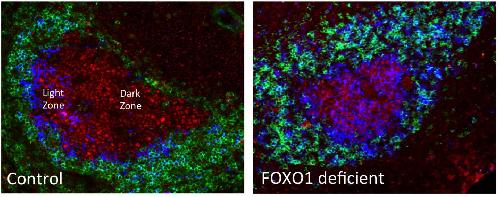B-cell lymphoma is one of the most common cancers derived from the lymphoid system. Lymphomagenesis is often linked to the so-called germinal center reaction. B lymphocytes represent a subgroup of the white blood cells, whose expansion after infection leads to germinal center formation. Within the germinal center, the 'light' zone selects the most highly functional germinal center B cells that have been generated in the 'dark' zone. This zoning leads to an efficient immune response. Klaus Rajewsky's group at the Max Delbrück Center for Molecular Medicine (MDC) in Berlin has now helped illuminate the processes within the dark zone. "The transcription factor FOXO1 was the main focus of our analyses," reports Sandrine Sander. She and her colleagues analyzed the impact of FOXO1 on B cells in the germinal center. "FOXO1 is a new key element for the formation of the dark zone and is thereby decisively involved in immune defense," emphasize Dr. Sander and Prof. Rajewsky, whose findings have been published in the current edition of Immunity.
The processes in the germinal center reaction are of interest for basic biomedical research also because their deregulation can lead to B cell tumors. In order to gain a better understanding of the pathological processes in the genesis of tumors, the scientists in Berlin investigated the germinal center reaction in genetically modified mice. The genetic modification allows for targeted influence on FOXO1 activity in germinal center B cells.
According to the new findings, FOXO1 is necessary not only for the formation of the germinal center dark zone but also for an efficient B cell response to pathogens.
 This image shows normal germinal center reaction in the spleen of control animals (left): after antigen contact B cells differentiate in germinal center B cells (red) which are surrounded by naive B cells (green). Within the germinal center the 'dark zone' and 'light zone' characterized by antigen-presenting cells (blue) can be clearly separated. //Disturbed germinal center formation upon FOXO1 ablation (right): In FOXO1-deficient mice, the 'dark zone' is lost and antigen-presenting cells (blue) are scattered throughout the germinal center. Credit: Research Group of Klaus Rajewsky/MDC Berlin
This image shows normal germinal center reaction in the spleen of control animals (left): after antigen contact B cells differentiate in germinal center B cells (red) which are surrounded by naive B cells (green). Within the germinal center the 'dark zone' and 'light zone' characterized by antigen-presenting cells (blue) can be clearly separated. //Disturbed germinal center formation upon FOXO1 ablation (right): In FOXO1-deficient mice, the 'dark zone' is lost and antigen-presenting cells (blue) are scattered throughout the germinal center. Credit: Research Group of Klaus Rajewsky/MDC Berlin
The findings were corroborated in an independent study conducted by Riccardo Dalla-Favera's group working at Columbia University in New York in an article that appears in the same issue of Immunity.
However, the studies do not yet explain how FOXO1 and its activity relate to lymphomagenesis. What is clear is that this transcription factor plays an important role in the normal germinal center reaction and that additional studies are warranted, since most B cell lymphomas arise from germinal center B cells. Also, activating mutations of FOXO1 have been detected in lymphoma patients, which points to its clinical relevance.
source: Max Delbrück Center for Molecular Medicine in the Helmholtz Association